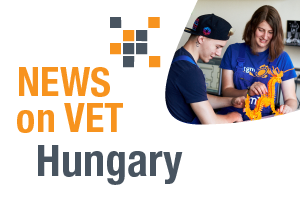How can project-based learning (PBL) be integrated into vocational education as a means of developing the soft and 21st century skills required in the world of work? This article presents a digital literacy initiative, whose framework and evaluation tools point towards the future of the world of work – as was done in Hungary.
Thematic weeks as part of the national curriculum in Hungary
A popular, yet important cornerstone of PBL in Hungary is the implementation of thematic weeks, which involve week-long programmes and projects to engage students, experts, parents, and the local and wider communities. This national initiative aims to enhance students' digital literacy by incorporating PBL into education institutions.
PBL and vocational education – professional and personal development
The European Commission's strategy for the European Year of Skills 2023 highlights the challenge faced by 77% of EU companies in finding workers with the necessary skills. PBL emerges as a methodology that can benefit both schools and businesses by promoting the development of essential 21st century skills. Moreover, PBL can help reintegrate an overly digital generation into society and encourage their interest in collaborative work, thus motivating them to grow professionally and personally.
The Digital Thematic Week, launched in 2016, has gained significant relevance in Hungary. Over 800 schools, including 10 Hungarian-language schools beyond the borders, participated in the initiative this year. On average, each school contributed three projects, reaching a total of around 120 000 students nationwide. The number of participating institutions has been steadily increasing, with 220 schools joining in February 2023 and the number exceeding 800 by the start of the week in March 2023 – the same stable rate after the fall due to COVID. A total of 22.6% of participating schools were vocational schools. This years’ participation highlights the growing relevance and importance of PBL in vocational education and training.
An exemplary project conducted during the Digital Thematic Week 2023 at the BMSZC Petrik Lajos Vocational School demonstrates a good practice for cross-curricular and inter-professional vocational projects. This project exemplifies how different stakeholders in education can collaborate to bridge the gap between the worlds of work and education.
Hungary has also excelled in the European-level initiative called EU Code Week, aimed at incorporating coding and digital literacy into everyday teaching practice. Since its inception in 2016, EU Code Week has accomplished more than 78 000 coding activities across more than 80 countries in 2022. Hungary's notable achievement in this regard is evidenced by its 8th position among the countries organising the most events in Europe, with a total of 1 327 Hungarian coding events. This represents a notable improvement compared to Hungary’s 10th ranking in 2021.
Thematic weeks provide a platform for collaboration among stakeholders in vocational education. Increased stakeholder involvement can enhance professional effectiveness at institutional, regional, and national levels. Actively integrating such initiatives into the curriculum can further promote PBL in the future, starting from early stages of education.
Read more
- Interview on experimental learning (Hungarian)
- Code Week 2022 wrap-up in numbers
- Project website of Digital Thematic Week (Hungarian)
- Individual learning pathways for teachers and students (Hungarian)
- European Year of Skills 2023
- Digital Thematic Week was a success (Hungarian)
|
Please cite this news item as: ReferNet Hungary; Cedefop (2023). Hungary: project-based learning for 21st century skill development. National news on VET |
